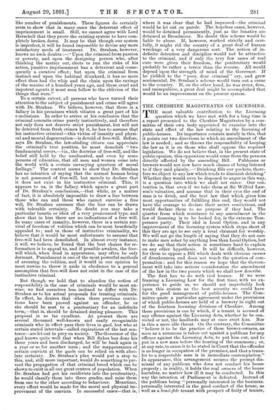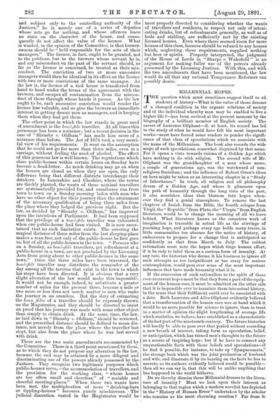THE CHESHIRE MAGISTRATES ON LICENSING. .
THE most valuable contribution to the Licensing question which we have met with for a long time is a report presented to the Cheshire Magistrates by a com- mittee of their own body appointed to examine into the state and effect of the law relating to the licensing of public-houses. Its importance consists mainly in this, that it points out two directions in which an amendment of the law is needed; and so throws the responsibility of keeping the law as it is on those who shall oppose the required legislation. We do not believe that, in the present state of public opinion, this opposition would come from the persons- directly affected by the amending Bill. Publicans or brewers would not now have much chance of being listened to if they said plainly,—' Drinking fills our pockets, there- fore we object to any law which tends to diminish drinking.' Whether they would even be disposed to argue in this way, is a question into which we shall not enter. Our con- tention is, that even if we take them at Sir Wilfrid Law- son's valuation, and assume that in their eyes the end of man is to drink, and the best law that which gives him most opportunities of fulfilling this end, they would not have the courage to declare their secret convictions, and would declare them to no purpose if they bad. Tile quarter from which resistance to any amendment in the law of licensing is to be looked for, is the extreme Tem- perance party. Their idol is Local Option, and in any improvement of the licensing system which stops short of this they are apt to see only a rival claimant for worship, We will not go the length of saying that they do not care to make men sober by anything less than Local Option, but we do say that their action is sometimes hard to explain on any other hypothesis. It will be difficult, however, for them to oppose a Bill which deals with obvious causes of drunkenness, and does not touch the question of com- pensation ; and for this reason we hope that the Govern- ment will take into serious consideration the amendment of the law in the two points which we shall now describe. The first has to do with tied houses. If we were framing a Licensing Law for the first time, with no ex- perience to guide us, we should not improbably look upon this system as the best security we could have for the good management of public-houses. The Com- mittee quote a particular agreement under the provisions of which public-houses are held of a brewery in eight out of the fourteen licensing divisions of Cheshire. Among these provisions is one by which, if a tenant is accused of any offence against the Licensing Acts, whether he be con- victed or not, the landlords may at once evict him. Nor is this a mere idle threat. On the contrary, the Committee " believe it to be the practice of these brewer-owners, as soon as a summons is taken out against a publican for any offence against the Licensing Acts, to put him out, and to put in a new man before the hearing of the summons ; or, at any rate, to cause it to be stated in Court that the offender is no longer in occupation of the premises, and that a trans- fer to a respectable man is in immediate contemplation." In appearance, this arrangement secures the prompt dis- missal of any publican who does not conduct his house properly ; in reality, it holds the real owners of the house harmless, no matter how ill it may be conducted. In this way the intention of Parliament is defeated. Instead of the publican being " personally interested in the business, personally interested in the good conduct of the house, as well as a bond -fide tenant with prospect of fixity of tenure, and subject only to the controlling authority of the Justices," he is merely one of a series of deputies whose acts go for nothing, and whose offences leave no stain on the character of the house, and conse- quently do not affect the value of the licence. What is wanted, in the opinion of the Committee, is that brewer- ownexa should be " held responsible for the acts of their managers." The licence, in fact, ought to be granted, not to the publican, but to the brewers whose servant he is, and any misconduct on the part of the servant should, so far as the licence is concerned, be treated as their mis- conduct. The conviction of two or more successive managers would then be identical in its effect on the licence with two or more convictions of the same manager. As the law is, the licence of a tied house is transferred from hand to hand under the terms of the agreement with the brewers, and escapes all contamination from the miscon- duct of those through whose hands it passes. As the law ought to be, each successive conviction would render the licence less valuable, and so give the brewers an immediate interest in getting decent men as managers, and in keeping them when they had got them.
The other point in which the law stands in great need of amendment is the bond-fide traveller. At all times this personage has been a nuisance ; but a recent decision in the ease of "Sheasby v. Oldham " has made him more of a nuisance than before. The Act of 1874 took a very merci- ful view of his requirements. It went on the assumption that he could not go for more than three miles, even in a carriage, without feeling the need of alcohol. The effect of this generous law is well known. The regulations which close public-houses within certain hours on Sunday have become a dead-letter. As much drinking may go on when the houses are closed as when they are open, the only difference being that different districts interchange their drinkers. In Lancashire and Cheshire, where the towns are thickly planted, the wants of these nominal travellers are systematically provided for, and omnibuses run from town to town on a Sunday morning laden with men who have no other object for their journey than the attainment of the necessary qualification of being three miles from the place where they lodged the previous night. But the law, as decided by "Sheasby v. Oldham," has improved upon the intentions of Parliament. It had been supposed that the privilege of a bond-fide traveller was exhausted when one public-house had been visited. It is now ascer- tained that no such limitation exists. The covering the magical distance of three miles from the last sleeping-place makes a man free, not only of the public-house he first goes to, but of all the public-houses in the town. " Persons who on a Sunday, as bona-fide travellers, get refreshment at a public-house in a town, are not precluded by the Licensing Acts from going about to other public-houses in the same town." Once the three miles have been traversed, the bond-fide traveller may distribute the remainder of the day among all the taverns that exist in the town to which his steps have been directed. It is obvious that a very slight alteration of the law would make this impossible. It would not be enough, indeed, to substitute a greater number of miles for the present three, because a mile or two more or less does not much matter to men who make the journey in an omnibus. But the duty of estimating the bona fides of a traveller should be expressly thrown on the Magistrates, and they should be directed to insist on proof that his journey was made with some other object than simply to obtain drink. At the same time, the law, as laid down in " Sheasby v. Oldham," should be reviewed, and the prescribed distance should be defined to mean dis- tance, not merely from the place where the traveller last slept, but also from the place where he was last served with drink.
These are the two main amendments recommended by the Committee. There is a third point mentioned by them, as to which they do not propose any alteration in the law, because the end may be attained by a more diligent and discriminating use of the powers already possessed by the Justices. They recognise two legitimate purposes which public-houses serve,—the accommodation of travellers, and the provision for the working class, " whose homes are too often small and cheerless," of " sociable and cheerful meeting-places." When these two wants have been met, the multiplication of mere " drinking-bars or tippling-houses " becomes purely mischievous. The judicial discretion vested in the Magistrates would be most properly directed to considering whether the wants of travellers and residents, in respect not only of intoxi- cating drinks, but of refreshments generally, as well as of beds and stabling, are sufficiently met by the existing licensed houses. Even where there seemed room for more houses of this class, licences should be refused to any houses which, neglecting these requirements, supplied nothing but beer or spirits. Properly interpreted, the judgment of the House of Lords in " Sharpe v. Wakefield " is an argument for making fuller use of the powers already possessed by the Licensing Justices. With this, and with the two amendments that have been mentioned, the law would do all that any rational Temperance Reformer can possibly desire.



































 Previous page
Previous page